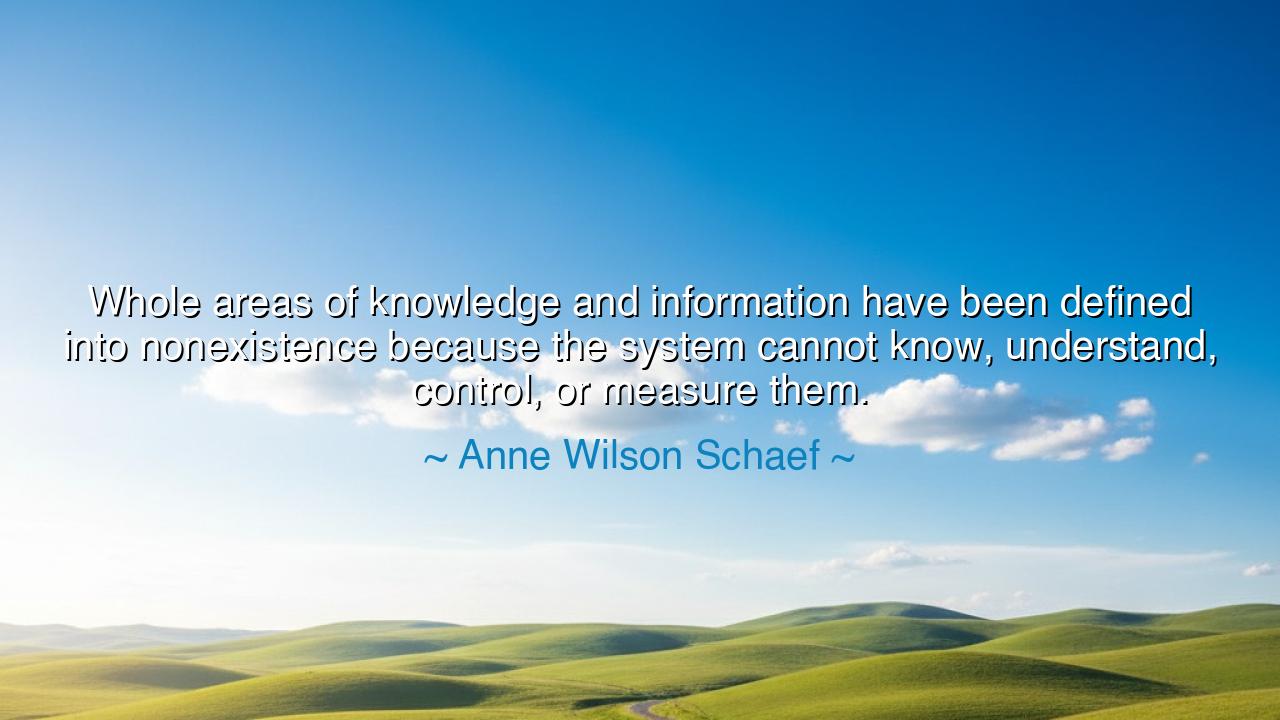
Whole areas of knowledge and information have been defined into
Whole areas of knowledge and information have been defined into nonexistence because the system cannot know, understand, control, or measure them.






The wise and perceptive thinker Anne Wilson Schaef, a psychologist and spiritual teacher who sought to awaken humanity from the illusions of its own systems, once declared: “Whole areas of knowledge and information have been defined into nonexistence because the system cannot know, understand, control, or measure them.” These words cut through the illusions of modern civilization like a blade of light through mist. They remind us that what we call knowledge is often bound by the walls of what society deems acceptable or comprehensible, and that the mysteries lying beyond these walls—though unseen—still exist, waiting for those brave enough to seek them. Schaef, like the prophets of old, warns us that a world that worships only what it can measure will one day forget how to feel, how to see, and how to know in the deeper sense of the soul.
The origin of this quote lies in Schaef’s critique of Western systems—scientific, political, educational, and economic—that claim authority over truth. She observed that these systems, while powerful, are limited by their obsession with control and quantification. What cannot be charted or proven by data is dismissed as unworthy of attention. Thus, vast realms of wisdom—intuition, spirituality, indigenous knowledge, feminine ways of knowing, the silent truths of emotion—are banished from the house of reason. Schaef, whose work bridged psychology and spirituality, saw this exclusion as a kind of cultural blindness: a refusal to acknowledge that the universe is larger than the tools with which we study it.
In her insight, we can hear echoes of the ancient struggle between the measurable and the mystical. Long before the modern age, societies that valued both science and spirit thrived in harmony. The sages of Egypt, the philosophers of India, the scholars of Greece—all understood that truth was not only what could be weighed or calculated but also what could be felt and experienced. Yet as time passed, human pride grew, and with it came the desire for dominance. Knowledge became a weapon of power rather than a path to wisdom. Systems arose—religious, academic, bureaucratic—that sought to define what is real and what is not. And in their arrogance, they defined entire forms of knowledge into nonexistence, banishing mystery to the margins of thought.
Consider, for instance, the fate of the indigenous peoples of the world, whose understanding of the Earth was once vast and sacred. Their wisdom of the land—how to read the stars, how to listen to the rivers, how to speak to the winds—was dismissed as superstition by colonizers who believed only in written science and metal instruments. Yet, centuries later, the modern world rediscovers what these ancient cultures always knew: that the Earth is alive, that all things are connected, and that the health of the spirit and the planet are one. What was once “defined into nonexistence” has returned, whispering again in the ears of those willing to listen.
Schaef’s words also speak to our personal lives. Each of us lives within systems—families, schools, governments, cultures—that shape how we see the world. These systems, though necessary for order, can also confine us. They tell us what to value, what to ignore, what to believe, and what to fear. How often have we dismissed our own intuition, our dreams, our inner sense of truth because they do not fit the definitions handed down to us? How often have we silenced the quiet voice within, simply because it could not be measured or explained? In this way, we, too, participate in the defining of knowledge into nonexistence.
O seeker of truth, take heed of this wisdom: the unseen is not the unreal. The fact that something cannot be controlled or quantified does not mean it does not exist—it may mean only that it belongs to a higher realm of understanding. The ancients taught that the universe has two books: the book of matter, and the book of spirit. The first can be studied by science; the second can only be known by experience, by humility, by love. To live wisely is to open both books—to walk with reason in one hand and reverence in the other. For only then do we begin to see the fullness of reality.
Therefore, let this be your practice: question every system that claims authority over your understanding. Honor the knowledge that arises in silence, in dreams, in the heart’s quiet knowing. Seek out the wisdom of the forgotten, the oppressed, the unseen, for often it is there that truth hides, waiting for rediscovery. Embrace mystery as a teacher, not an enemy. And remember always the counsel of Anne Wilson Schaef—that to define something out of existence is the gravest sin of the intellect, for it blinds the spirit. True knowledge is not the domination of what can be known, but the reverence for what cannot.
For the wise know this: that the greatest truths dwell in the spaces beyond our comprehension, where reason ends and wonder begins. And it is only when we make peace with mystery that we become truly knowledgeable, not in the eyes of systems, but in the eyes of the universe itself.






AAdministratorAdministrator
Welcome, honored guests. Please leave a comment, we will respond soon